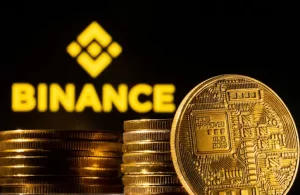Table of Contents
The Securities and Exchange Commission of Nigeria has declared the operations of Binance Nigeria Limited illegal


The Securities and Exchange Commission of Nigeria has declared the operations of Binance Nigeria Limited, the Nigerian subsidiary of the world’s largest cryptocurrency exchange as illegal.

Join our Telegram Channel for Updates
The commission stated that the crypto platform is neither registered nor regulated by the commission and its operations in Nigeria are therefore illegal. Any member of the investing public dealing with the entity is doing so at his/her own risk.
Furthermore, the Commission has directed the crypto company to immediately stop soliciting Nigerian investors in any form whatsoever. The commission has also warned Nigerian investors that investing in crypto-assets is extremely risky and may result in a total loss of their investment.
The crypto platform has not yet commented on the matter. This action by the Commission comes after the U.S. Securities and Exchange Commission sued crypto platform and Coinbase for allegedly breaching its rules.
CHECK: President Tinubu Suspends Godwin Emefiele As CBN Governor
It is important to note that last year, Nigeria’s SEC published a set of regulations for digital assets, signaling Africa’s most populous country was trying to find a middle ground between an outright ban on crypto assets and their unregulated use. However, the Central Bank of Nigeria does not recognize cryptocurrencies as legal tender and commercial banks are banned from engaging in crypto transactions in the country.
According to the SEC, Binance Nigeria is not registered or regulated by the Commission, making its operations in Nigeria illegal. The SEC has ordered Binance Nigeria to stop soliciting Nigerian investors in any form whatsoever. The SEC's complaint alleges that since at least July 2017, Binance.com and Binance.US, while controlled by Zhao, operated as exchanges, brokers, dealers, and clearing agencies and earned at least $11.6 billion in revenue from, among other things, transaction fees from U.S. customers. The SEC also alleged that Binance and Zhao secretly controlled customers’ assets, allowing them to commingle and divert customer funds. The SEC has warned Nigerians that investing in crypto-assets is extremely risky and may result in a total loss of their investment. Nigerians who use Binance Nigeria are doing so at their own risk. The SEC has not provided a specific reason for its decision to declare Binance Nigeria illegal. However, it is likely that the SEC is concerned about the lack of regulation and oversight of cryptocurrency trading platforms in Nigeria. Nigerians who have invested in Binance Nigeria should be cautious and monitor the situation closely. They should also consider seeking professional advice from a financial advisor or lawyer. No, Binance Nigeria is not the only cryptocurrency trading platform that has been declared illegal in Nigeria. Last year, Nigeria's central bank banned banks and financial institutions from engaging with crypto transactions in the country. The decision by the SEC to declare Binance Nigeria illegal is a blow to Binance's operations in Nigeria, which is one of the region's most prominent crypto hubs and Africa's most populous country. It remains to be seen how Binance Nigeria would react to this latest development. Binance should work with the SEC to address any concerns it has about its operations in Nigeria. It should also take steps to ensure that its operations in other countries are compliant with local laws and regulations. FAQs
Why has Binance Nigeria been declared illegal?
What are the implications of the SEC's order for Binance's users in Nigeria?
What does this mean for Nigerians who use Binance Nigeria?
What is the reason behind the SEC's decision to declare Binance Nigeria illegal?
What should Nigerians do if they have invested in Binance Nigeria?
Is Binance Nigeria the only cryptocurrency trading platform that has been declared illegal in Nigeria?
What are the implications of this decision for Binance as a company?
What should Binance do to address the situation?









